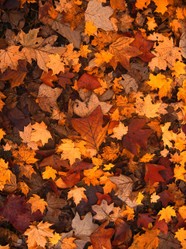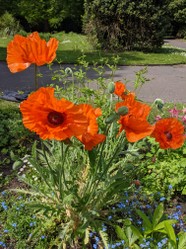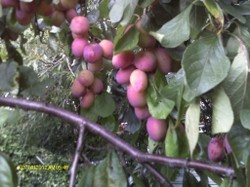I need to complete the transformation of the plot into a container and raised bed garden. This process has gone well and is nearly completed. I have yet to fill the containers with compost, as there is no need during the autumnal and winter sleep of the garden. More pressing will be to keep the geotextile mulch clear of leaves, which would in the long term turn to soil and attract weeds.
More important is the need to trim the bushes. My jostaberry is not as productive as it once was and so it must come down, but that job can wait a while. I need to prune the blackcurrants, which have not done well due to the unsettled weather conditions in Britain. Much work is needed on the gooseberries as well, whose spiny stems are rather daunting to work on.
But work on the greenhouses is necessary. I have two of them, and until this year simply grew in pots on the greenhouse floor, but recently I used some money to purchase greenhouse staging, two-tiered metal tables four feet long. This purchase has been driven by a recognition that I need to take the strain off my back. I grow chilis, aubergines [egg plants] and bell peppers in the smaller greenhouse and I will use the upper tier for plants and the lower tier for storage. I do need better storage facilities for tools, but there is the problem of where to site the shed. I am slowly working at the fiddly job of assembling the staging. It is a straightforward task, but I am not especially dexterous with my fingers and so it takes me some time. I am still assembling the first of the two tables. There are just so many nuts and bolts!
The larger greenhouse, which is eight feet long, where I grow tomatoes, needs its floor replacing.I had had a problem with weeds intruding through the wood chip floor [possibly their seeds were in the wood chip] and so I imported a large tarpaulin and laid it down.But it is too large for the greenhouse and makes the floor uneven, so up it will come and be replaced by geotextile mulch. Here is where Andrew comes in useful. The structure is weighed down against the wind by paving stones inside, which are laid on the inward pointing edges of the frame. They will need lifting and replacing after I lay the fabric. But for safety's sake they should be lifted by two people. The medics would not be too happy if they get my back right only for me to damage it again lifting heavy weights.
I need to clear some scrap wood, but the way is to wait for November the fifth, Guy Fawkes night, when people hold bonfires to commemorate the failure of the Gunpowder plot in 1605 when plotters attempted to blow up parliament. The allotment holds a bonfire, but while I will give them scrap wood, I will not be going, as I have the Annual General Meeting of the local branch of the National Vegetable Society that night, which is a pleasant party night.
Finally the pond needs cleaning out. I won't do this in summer as I don't want to kill and pond creatures, but the frogs will now be in the warmth of the compost heap, burrowed against the cold and predators [foxes eat frogs.] That is why I will not shift my compost in winter.I don't want to disturb hibernating creatures










 Pilgrimage. A review27 days ago
Pilgrimage. A review27 days ago
 Leo the Fourteenthon 05/09/2025
Leo the Fourteenthon 05/09/2025
 The Melsonby Hoardon 03/25/2025
The Melsonby Hoardon 03/25/2025




Comments
Thank you for your comment below in answer to my previous observation and question.
Potassium acts as a major nutrient in soil fertilizers. Is it applied alone or with other organic-obtained nutrients?
Providing potassium to the soil
Thank you for your comment below in answer to my previous observation and question.
The Arborist News article encourages arborists and land managers to add new organic material as the dead-wood habitat and retention pile gets unaesthetic and unsafe. It features nothing about the disposal, such as by burning or composting.
Your answer Oct 9, 2019, indicates that "We don't have a shredder, so wood prunings are either burnt for ash or put in the compost heap. I compost grass clippings and am constructing a leaf mould bin to contain fallen leaves."
What might the ashes from burning wood prunings be used for?
Yes
Thank you for your comment below, on Oct. 19, 2019, in answer to my previous, same-day observation and question.
My question and your answer about wood prunings caused me to consider the Arborist News August 2024, with its article Taking an ecosystem approach to tree management by Sweden's Johan Östberg of The Tree Office and Vikki Bengtsson of ProNatura.
Europe's VETcert certification and the two authors encourage dead-wood piles and standing dead trees because of the nesting, nutrient-cycling, soil-fertilizing microorganisms and organisms there.
Is such a trend evident in the British Isles?
There are plenty of magpies where we live.
What a pleasant article! I especially delighted in the presence of magpies, as they are rare in places I frequent. (I spend most of my time in Bucharest.) In fact I have a photo of my phone with the birds of one of our parks and there are no magpies. I did see some, though, in the gardens of a monastery near Bucharest.
Where I live we do not grow winter tomatoes, except in heated glasshouses, which I don't have.
Looks like you are busy. And from the details it seems global climate change is affecting your garden.
A few weeks back, in late August, the horticulturist on the radio was saying it was then time to plant a winter tomato crop. I suppose it is not possible in colder climates. Indeed, waiting for summer to abate was the problem, so heat tolerant tomatoes were the recommendation.
Your area. Derdriu, sounds beautiful.Some of your species we don't have in the UK, such as bluebirds and blue jays, mourning doves and mockingbirds. While I have seen jays in woodland we have never had any on the allotment.
We don't have a shredder, so wood prunings are either burnt for ash or put in the compost heap. I compost grass clippings and am constructing a leaf mould bin to contain fallen leaves